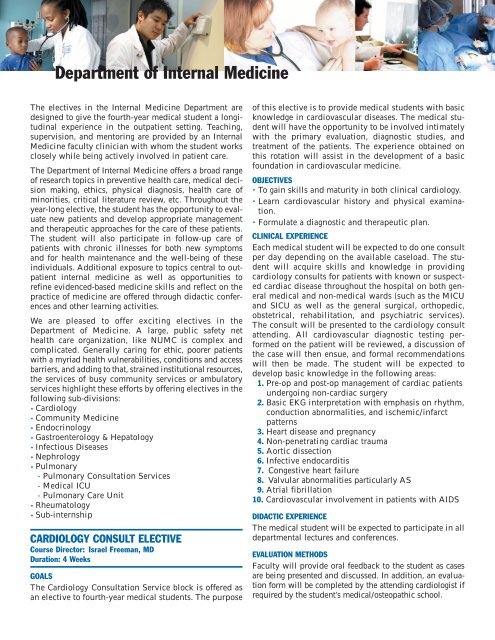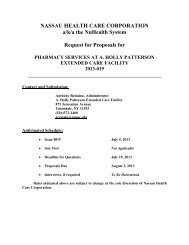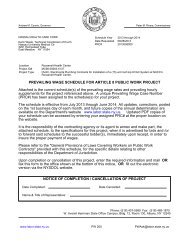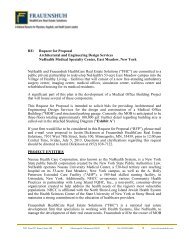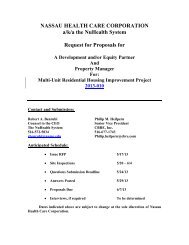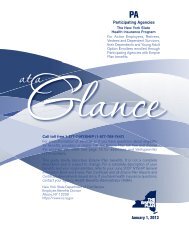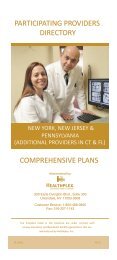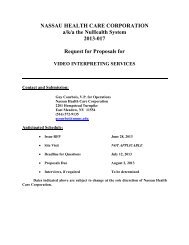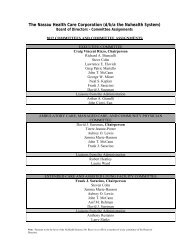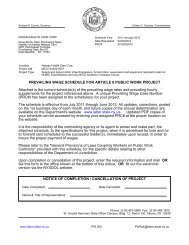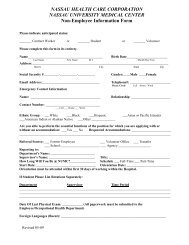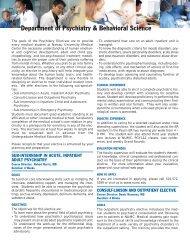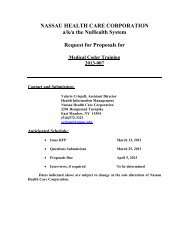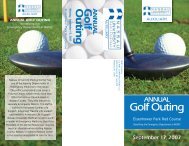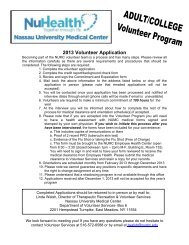Department of Internal Medicine - Nassau University Medical Center
Department of Internal Medicine - Nassau University Medical Center
Department of Internal Medicine - Nassau University Medical Center
Create successful ePaper yourself
Turn your PDF publications into a flip-book with our unique Google optimized e-Paper software.
<strong>Department</strong> <strong>of</strong> <strong>Internal</strong> <strong>Medicine</strong>The electives in the <strong>Internal</strong> <strong>Medicine</strong> <strong>Department</strong> aredesigned to give the fourth-year medical student a longitudinalexperience in the outpatient setting. Teaching,supervision, and mentoring are provided by an <strong>Internal</strong><strong>Medicine</strong> faculty clinician with whom the student worksclosely while being actively involved in patient care.The <strong>Department</strong> <strong>of</strong> <strong>Internal</strong> <strong>Medicine</strong> <strong>of</strong>fers a broad range<strong>of</strong> research topics in preventive health care, medical decisionmaking, ethics, physical diagnosis, health care <strong>of</strong>minorities, critical literature review, etc. Throughout theyear-long elective, the student has the opportunity to evaluatenew patients and develop appropriate managementand therapeutic approaches for the care <strong>of</strong> these patients.The student will also participate in follow-up care <strong>of</strong>patients with chronic illnesses for both new symptomsand for health maintenance and the well-being <strong>of</strong> theseindividuals. Additional exposure to topics central to outpatientinternal medicine as well as opportunities torefine evidenced-based medicine skills and reflect on thepractice <strong>of</strong> medicine are <strong>of</strong>fered through didactic conferencesand other learning activities.We are pleased to <strong>of</strong>fer exciting electives in the<strong>Department</strong> <strong>of</strong> <strong>Medicine</strong>. A large, public safety nethealth care organization, like NUMC is complex andcomplicated. Generally caring for ethic, poorer patientswith a myriad health vulnerabilities, conditions and accessbarriers, and adding to that, strained institutional resources,the services <strong>of</strong> busy community services or ambulatoryservices highlight these efforts by <strong>of</strong>fering electives in thefollowing sub-divisions:• Cardiology• Community <strong>Medicine</strong>• Endocrinology• Gastroenterology & Hepatology• Infectious Diseases• Nephrology• Pulmonary- Pulmonary Consultation Services- <strong>Medical</strong> ICU- Pulmonary Care Unit• Rheumatology• Sub-internshipCARDIOLOGY CONSULT ELECTIVECourse Director: Israel Freeman, MDDuration: 4 WeeksGOALSThe Cardiology Consultation Service block is <strong>of</strong>fered asan elective to fourth-year medical students. The purpose<strong>of</strong> this elective is to provide medical students with basicknowledge in cardiovascular diseases. The medical studentwill have the opportunity to be involved intimatelywith the primary evaluation, diagnostic studies, andtreatment <strong>of</strong> the patients. The experience obtained onthis rotation will assist in the development <strong>of</strong> a basicfoundation in cardiovascular medicine.OBJECTIVES• To gain skills and maturity in both clinical cardiology.• Learn cardiovascular history and physical examination.• Formulate a diagnostic and therapeutic plan.CLINICAL EXPERIENCEEach medical student will be expected to do one consultper day depending on the available caseload. The studentwill acquire skills and knowledge in providingcardiology consults for patients with known or suspectedcardiac disease throughout the hospital on both generalmedical and non-medical wards (such as the MICUand SICU as well as the general surgical, orthopedic,obstetrical, rehabilitation, and psychiatric services).The consult will be presented to the cardiology consultattending. All cardiovascular diagnostic testing performedon the patient will be reviewed, a discussion <strong>of</strong>the case will then ensue, and formal recommendationswill then be made. The student will be expected todevelop basic knowledge in the following areas:1. Pre-op and post-op management <strong>of</strong> cardiac patientsundergoing non-cardiac surgery2. Basic EKG interpretation with emphasis on rhythm,conduction abnormalities, and ischemic/infarctpatterns3. Heart disease and pregnancy4. Non-penetrating cardiac trauma5. Aortic dissection6. Infective endocarditis7. Congestive heart failure8. Valvular abnormalities particularly AS9. Atrial fibrillation10. Cardiovascular involvement in patients with AIDSDIDACTIC EXPERIENCEThe medical student will be expected to participate in alldepartmental lectures and conferences.EVALUATION METHODSFaculty will provide oral feedback to the student as casesare being presented and discussed. In addition, an evaluationform will be completed by the attending cardiologist ifrequired by the student’s medical/osteopathic school.
HOW TO APPLYIf you are interested in applying, please call 516-572-5399 or visit us at www.numc.edu.CARDIOLOGY AMBULATORY CARE CLINICELECTIVECourse Director: Rosalind Watman, DODuration: 4 WeeksGOALSThe ambulatory educational experience will allow the studentto participate in the care <strong>of</strong> patients having a widespectrum <strong>of</strong> cardiovascular disorders. In this setting,emphasis is placed on gathering information concerningthe patient’s past cardiac history and prior cardiac investigations.Utilizing this information, the student will beginto learn how to formulate a diagnostic and therapeuticplan and then arrange for its implementation in an appropriate,cost-effective manner.OBJECTIVESConcepts that the student will be expected to learninclude:1. Cardiovascular risk factor assessment2. Pharmacology <strong>of</strong> anti-anginal medications3. Treatment algorithms for hypercholesterolemia andhypertriglyceridemia4. Selection <strong>of</strong> grade exercise testing versus nuclearperfusion imaging techniques5. Coronary revascularization options6. Indications for and selection <strong>of</strong> vasodilators, betablockers,diuretics, and digitalis in heart failure7. General medical management and timing <strong>of</strong> surgeryin regurgitant and stenotic valve lesions8. Selecting the appropriate antihypertensive medicationswith respect to patient’s age, sex, race and comorbidclinical conditions as well as costs9. Evaluation <strong>of</strong> the cardiac patent undergoing non-cardiacsurgery including indications for nuclear perfusion imagingstudies in patients undergoing vascularsurgery10. Basic understanding <strong>of</strong> cardiovascular physiologyduring pregnancy and safety and utility <strong>of</strong> variousdrugs during pregnancy to treat maternal heart disease.EVALUATION METHODFaculty will provide oral feedback to the student as casesare being presented and discussed. In addition, an evaluationform will be completed by the attending cardiologist ifrequired by the student’s medical/osteopathic school.HOW TO APPLYIf you are interested in applying, please call 516-572-5399 or visit us at www.numc.edu.COMMUNITY MEDICINE ELECTIVECourse Director: Christine Brown, MDDuration: 4 WeeksGOALTo provide students with practice-oriented and/or service-orientedlearning opportunities related to communitymedicine. Students will learn about the types and functions<strong>of</strong> the formal and informal medical, public health,and social support programs involved in communityhealth care.OBJECTIVES1. Focus on health promotion and disease prevention inthe community-based setting and as applied to populations<strong>of</strong> patients.2. Demonstrate the importance <strong>of</strong> the physical environment,the social environment, and access to care in determiningthe health <strong>of</strong> populations.3. Enhance students’ understanding <strong>of</strong> the relationshipbetween culture and health, and improve their skillsin delivering culturally sensitive health care services.4. Expose students to the social, financial, and ethicalaspects <strong>of</strong> limiting and promoting access to health carefor vulnerable populations.5. Students should demonstrate an ability to evaluate andmanage common acute and chronic ambulatory illnessesin a well-reasoned manner.6. Students will be able to develop a patient-centeredapproach to the evaluation and management <strong>of</strong>patients commonly seen in ambulatory care setting.7. Students will be able to develop and refine the basicclinical skills <strong>of</strong> interviewing patients and performingan accurate physical exam.8. Students will be able to apply the principles <strong>of</strong> longitudinaland comprehensive health care, includingconsideration <strong>of</strong> familial, community, and culturalinfluences on health behavior.9. Students will be able to apply the principles <strong>of</strong> preventivemedicine in a primary care setting.10. Students will develop pr<strong>of</strong>essional values and attitudes,and apply ethical principles to the physicianpatientrelationship.CLINICAL EXPERIENCEThe medical team comprises <strong>of</strong> two medical students,which will be “mentored” by a faculty member in the<strong>Department</strong> <strong>of</strong> Community <strong>Medicine</strong>. Each team isassigned at each <strong>of</strong> four [satellite] Community Health<strong>Center</strong>s, and one at <strong>Nassau</strong> <strong>University</strong> <strong>Medical</strong> <strong>Center</strong>’s<strong>Center</strong> for Hypertension, Diabetes and Vascular<strong>Medicine</strong>, located within the <strong>Medical</strong> <strong>Center</strong>, but activelyinvolved in community outreach and linkages to ourcommunity health centers and private practitioners. Thestudents will be exposed to and understand the concepts<strong>of</strong> “primary” and “specialty” care outpatient services,“medical homes,” referral patterns, follow-up issues anda host <strong>of</strong> other items including the challenges <strong>of</strong> cultural,ethnic and disparities in health care.
DIDACTIC EXPERIENCEThe medical student will be expected to participate in alldepartmental lectures and conferences.SUGGESTED READING MATERIAL:Community-Oriented Primary Care: Health Care for the 21stCentury, Edited by Robert Rhyne, MD American Public HealthAssociationEVALUATION METHODThroughout the rotation, there will be clinical observationand feedback by the mentor as well as other facultymembers.At the rotation’s end, based upon a patient seen duringthe month, a brief (10-15 minutes) case presentation,didactic discussion and Q&A will be presented to the student’scolleagues and Faculty.HOW TO APPLYIf you are interested in applying, please call 516-572-5399 or visit us at www.numc.edu.ENDOCRINOLOGY ELECTIVECourse Director: Salini Kumar, MDDuration: 4 WeeksGOALSDuring the four weeks <strong>of</strong> the elective, medical studentswill become familiar with the pathophysiology, diagnosis,and management <strong>of</strong> endocrine disorders. In order toachieve this goal they must:• Achieve basic knowledge <strong>of</strong> the normal physiology <strong>of</strong>the endocrine glands.• Become facile in obtaining a history specific toendocrine and metabolic disorders.• Learn to perform a physical examination with particularattention to the multi-system manifestations <strong>of</strong>endocrine diseases.• Develop the ability to form a comprehensiveendocrinologic differential diagnosis.• Appreciate how to plan a logical, cost-effective work-up <strong>of</strong>patients with specific endocrinologic disorders.• Learn to interpret common endocrine laboratory testsand hormone measurements.• Have specific understanding <strong>of</strong> the long-term management<strong>of</strong> patients with diabetes mellitus, thyroid disease,osteoporosis, and lipid disorders.OBJECTIVESDuring the elective, students will acquire in-depth skillsand knowledge by:• Performing endocrinology consultations supervised bythe endocrinology fellow and endocrinology attending.• Making formal consultations rounds five days perweek.• Attending the general endocrinology clinic weekly, thediabetes clinic at least once weekly, and the monthlymetabolic bone and hyperlipidemia clinics.• Attending and participating in the weekly endocrinedivision conferences, which include endocrine grandrounds, journal club, and nuclear medicine conference,and attending <strong>Department</strong> <strong>of</strong> <strong>Medicine</strong> grandrounds.• Observing the performance <strong>of</strong> fine- needle thyroidaspiration and thyroid ultrasound examinations at thethyroid biopsy clinic.• Reading general endocrinology with specific attentionto the disorders affecting the patients they are assignedand presenting a subject review during consultationrounds.• Learning about Diabetes mellitus type 1 and 2, ThyroidDisease, Disorders <strong>of</strong> Calcium Metabolism, Metabolic BoneDisease, Endocrine Hypertension and Lipid Disorders.SUGGESTED READING MATERIALHarrison’s Principles <strong>of</strong> <strong>Internal</strong> <strong>Medicine</strong> by Eugene Braunwald,Anthony S. Fauci, Dennis L. Kasper, Stephen L. Hauser,J. Larry Jameson, Richard M. Stone.Cecil’s Textbook <strong>of</strong> <strong>Medicine</strong> by Lee Goldman, Dennis ArthurAusiello, William Arend, and James O. Armitage.Williams Textbook <strong>of</strong> Endocrinologyby Henry M. Kroneberg & al.CLINICAL EXPERIENCEThrough clinical experience, students will learn therudiments <strong>of</strong>:• Cortrosyn (rapid ACTH) test• Dexamethasone suppression test• Bone densitometry tests (DXA)• Hormonal responses to stress and hypoglycemia• Different modalities <strong>of</strong> thyroid gland imaging• The use <strong>of</strong> dynamic hormone testing and when imagingis indicatedDIDACTIC EXPERIENCEThe medical student will be expected to participate inall departmental lectures and conferences.EVALUATION METHODS• Clinical observation by attending physicians• Evaluation by endocrine fellows• Participation in rounds and conferencesHOW TO APPLYIf you are interested in applying, please call 516-572-5399 or visit us at www.numc.edu.
GASTROENTEROLOGY & HEPATOLOGYELECTIVECourse Director: Paul Mustacchia, MDDuration: 4 WeeksGOALSThe goals <strong>of</strong> the elective rotation are to provide the studentwith an introductory inpatient and outpatient consultativeexperience; and to introduce them to the management<strong>of</strong> gastrointestinal and liver disorders.Additionally, students will be trained to competentlyevaluate, manage, and follow common gastroenterologicillnesses.OBJECTIVESThe objectives <strong>of</strong> the Gastroenterology elective are toexpose medical students to:• Basic pathophysiology <strong>of</strong> gastrointestinal diseases.• Recognized common diseases <strong>of</strong> the tubular gut, gallbladder,pancreas, and liver along with appropriatediagnostic and therapeutic plans.Every patient evaluated by a student in either the clinicsetting or the inpatient consult setting will be examinedand reviewed in detail with the attending physician. Ata minimum, this review will include discussion <strong>of</strong> thehistory and physical examination findings, differentialdiagnosis, and diagnostic and therapeutic managementplans.CLINICAL EXPERIENCEClinical experience will include co-management <strong>of</strong> patientswith a wide variety <strong>of</strong> digestive and liver disorders, in boththe inpatient and outpatient settings. There will be anemphasis on the pathophysiology, clinical manifestations,and treatment <strong>of</strong> gastrointestinal disorders. Additionallythe medical students will observe endoscopy performed bythe gastroenterologists to gain knowledge <strong>of</strong> the appearance<strong>of</strong> normal gastroenterologic anatomy and the appearance <strong>of</strong>pathology.The medical students will demonstrate understanding<strong>of</strong> diagnosis, treatment, and long-term management <strong>of</strong>the following GI diseases:1. hepatitis, including evaluating abnormal liver functiontests2. pancreatitis3. peptic ulcer disease and nonulcer dyspepsia4. colon cancer5. cholelithiasis, cholecystitis6. irritable bowel syndrome7. inflammatory bowel disease8. ascites and its evaluation9. GERD10. GI bleeding11. hepatic cirrhosisDIDACTIC EXPERIENCE• Students are expected to attend all regularly scheduledprogram conferences, including morning report, coreconference, journal club, morbidity and mortality conference,and pathology conference.• Selected clinical review literature in gastroenterologyand hepatology is presented to the student for readingand discussion.• The student will also observe endoscopic proceduresincluding diagnostic and therapeutic EGD andcolonsocopy. The student can also arrange to observemortality studies, endoscopic ultrasound, ERCP, stentplacement and other advanced GI procdures.OBJECTIVESDuring their rotation, medical students will work with<strong>Internal</strong> <strong>Medicine</strong> residents to become familiar with thepathogenesis, diagnosis, and treatment <strong>of</strong> a wide variety<strong>of</strong> infectious diseases. They will always be supervisedby an Infectious Disease attending on the consult service.The course objectives include:1. Obtain an accurate and thorough history from thepatient, patient’s family, and available records.2. Perform a complete and accurate physical examination.3. Being able to recognize dermatological manifestations<strong>of</strong> different infectious diseases.4. Evaluate lab and diagnostic radiographic studies inpatients with infections.5. Develop a differential diagnosis, recognizing whichillnesses are most likely to be causing the specificproblem.6. Discuss appropriate antibiotic options, if indicated,including calculation and adjustment <strong>of</strong> dosage <strong>of</strong>antibiotic therapy in patients with renal compromise.7. Interpret levels <strong>of</strong> antibiotics.INFECTIOUS DISEASES ELECTIVECourse Director: Shadab Ahmed, MDDuration: 4 WeeksCLINICAL EXPERIENCEPrinciples <strong>of</strong> host defense, microbial pathogenicity, prevention<strong>of</strong> infection, diagnosis <strong>of</strong> infection, and antimicrobialtherapy are covered. Students are an integral part<strong>of</strong> the consulting team for patients with infectious diseaseproblems. They prepare consult notes and participate inrounds, conferences, and seminars. Special sessions in theInfectious Diseases and Aids Clinic, the Venereal DiseaseClinic, and the clinical microbiology laboratory are provided.Small group seminars are held with the faculty onmajor topics. In addition, a tour <strong>of</strong> the microbiology laboratorywill introduce students to relevant diagnostic testsand their interpretation.
DIDACTIC EXPERIENCEIn addition to daily teaching rounds, students attendthe following conferences:Journal Club Case Presentations. Twice a month, theInfectious Diseases attendings, HIV scholars, and residents/medicalstudents critically review current journalarticles. All members <strong>of</strong> the Infectious Disease team aregiven copies <strong>of</strong> the articles prior to the meeting to encouragediscussion.<strong>Medical</strong> Grand Rounds are held on Thursday mornings; usuallya guest speaker presents a lecture. The speakers areselected for their ability as lecturers and the topics arechosen so as to cover a variety <strong>of</strong> important subjects inInfectious Diseases over the course <strong>of</strong> the year (3–4 timesa year).Morning reports. As needed.Mortality and Morbidity conferences are held about 3–4 timesper year when infectious diseases cases are presented.An HIV Primary Care Conference is held every Thursdaymorning with both hospital and community consultants.SUGGESTED READING MATERIALMandell, Douglas and Bennett's Principles and Practices <strong>of</strong> InfectiousDiseases; 6th editionEVALUATION METHOD100% clinical observation and case presentations.HOW TO APPLYIf you are interested in applying, please call 516-572-5399 or visit us at www.numc.edu.The medical student joins the renal consult team. Thestudent will be expected to see patients on his/her ownunder the guidance <strong>of</strong> the renal fellow. The case willthen be presented to the renal attending who togetherwith the student will speak with and examine thepatient, review the laboratory work and radiologicaltests as necessary, and then review the case with thestudent and fellow and any medical resident on theservice. The student will also attend the renal and peritonealdialysis clinics and see patients in conjunctionwith one <strong>of</strong> the fellows. The case will then be presentedto and seen by the attending and discussed with thestudent and fellow.DIDACTIC EXPERIENCEThe medical student will be expected to participate inall divisional lectures and conferences.Topics or articles may be assigned to students for presentation.EVALUATION METHOD100% clinical observation.HOW TO APPLYIf you are interested in applying, please call 516-572-5399 or visit us at www.numc.edu.NEPHROLOGY ELECTIVEDivision Chief: Leah Balsam, MDDuration: 4 WeeksGOALSStudents will understand the fundamentals related toacute, chronic, and end-stage renal disease (ESRD), includinghemodialysis, peritoneal dialysis, and renal transplantation.In addition they will be expected to learn aboutglomerular and tubulo-interstitial diseases, acid-base andelectrolyte abnormalities, and hypertension.OBJECTIVESThe medical student will develop knowledge in thediagnosis and management <strong>of</strong> inpatient and out-patientnephrologic conditions. Patients will be evaluated onthe medical, surgical, and (occasionally) obstetricfloors. Patients will be also evaluated on the medicaland surgical, and (occasionally) patient ICUs, as well astelemetry and PCU. In addition to general consults, themedical student will be exposed to acute hemodialysisand peritoneal dialysis in these settings.25 A GUIDE TO C LINICAL R OTATIONS
Pulmonary Outpatient and Consultation ServicesConsultation Services is designed to allow the medicalstudent to participate in outpatient and inpatient consultations,under the auspices <strong>of</strong> a medical resident and pulmonarystaff physician. The medical student will performoutpatient clinic evaluations and inpatient consultationevaluations and will interpret pulmonary function testing.He/she will also observe fiberoptic bronchoscopesand other special procedures when appropriate. He/shewill perform history and physical examinations andwrite-ups and discuss appropriate plans for patient care.The medical student will also participate in the<strong>Department</strong> <strong>of</strong> <strong>Medicine</strong> weekly conferences and allPulmonary subspecialty conferences.The program <strong>of</strong>fers two pathways, one focused on clinicaltraining and research, and the other on clinical trainingand basic, bench-top research. Students rotating atNUMC provide primary and consultative care for patientswith a wide range<strong>of</strong> pulmonary disorders under thedirect supervision <strong>of</strong> a pulmonologist. There will beexposure to the <strong>Medical</strong> Intensive Care Unit, PulmonaryCare Unit, and general hospital pulmonary consultationsand procedures. The following description is a generalguideline for the elective. If you have any questions aboutour programs, please contact us. We will be happy toassist you.MEDICAL INTENSIVE CARE UNIT (MICU)ELECTIVECourse Director: Javed Iqbal, MD, MPH, FCCPDuration: 4 WeeksGOALSThe goals <strong>of</strong> the MICU elective is to provide medicalstudents with a suitable background in critical caremedicine and outpatient settings.OBJECTIVES<strong>Medical</strong> students are expected to learn:• Critical care physiology• Principles <strong>of</strong> managing respiratory failure• Basic as well as advanced modes <strong>of</strong> mechanical ventilation• Principles <strong>of</strong> managing various shocks; septic, cardiac,neurogenic, etc.• Acid-base disorders and its clinical application• Manage fluid and electrolyte abnormalities• Basics <strong>of</strong> nutrition supplementation in critical careunits• Managing neurological disordersEXPERIENCEThe experience and knowledge gained during this electiveshould provide medical students with the backgroundto perform an initial evaluation in the treatment<strong>of</strong> critically ill patients.DIDACTICS EXPERIENCEThe student will participate in didactic sessions includinggrand rounds, journal clubs, and lectures.EVALUATION METHODS: Clinical observation will be completedmainly by the course director.HOW TO APPLYIf you are interested in applying, please call 516-572-5399 or visit us at www.numc.edu.PULMONARY CONSULTATION SERVICEELECTIVECourse Director: Ashok Karnik, MD, FACP, FCCP, FRCPDuration: 4 WeeksGOALSTo acquire knowledge and have clinical experience witha broad range <strong>of</strong> pulmonary problems in an inpatientsetting, including obstructive lung diseases, pulmonaryinfections, occupational and environmental lung disease,acute and chronic respiratory failure, and geneticdisorders <strong>of</strong> the respiratory system.OBJECTIVESThe Pulmonary elective rotation provides students withthe opportunity to acquire knowledge <strong>of</strong>, and to have aclinical experience, with a broad range <strong>of</strong> pulmonaryproblems in inpatient and outpatient settings.To acquire knowledge <strong>of</strong> and to have a clinical experiencewith a broad range <strong>of</strong> pulmonary problems in inpatientand outpatient settings, including obstructive lung diseases,pulmonary infections, diffuse interstitial lung disease,pulmonary vascular disease, occupational and environmentallung disease, iatrogenic lung diseases, pulmonarymanifestations <strong>of</strong> systemic diseases, acute andchronic respiratory failure, disorders <strong>of</strong> the pleura andmediastinum, and genetic disorders <strong>of</strong> the respiratorysystem.CLINICAL EXPERIENCE<strong>Medical</strong> students will:• Learn outpatient consultation and management <strong>of</strong> awide range <strong>of</strong> pulmonary problems.• Learn inpatient management and care <strong>of</strong> the pul-
monary complications <strong>of</strong> surgery and postoperativerespiratory failure.• Acquire knowledge <strong>of</strong> and competence in the use <strong>of</strong>oxygen therapy, CPAP, mechanical ventilators, weaningand respiratory care techniques, management <strong>of</strong>pneumothorax, interpretation <strong>of</strong> sputum samples,BAL samples, pleural fluid, and lung tissue.• Learn and develop pr<strong>of</strong>iciency in interpreting theindications, contraindications, complications andlimitations <strong>of</strong> pulmonary functions tests, includingspirometry, flow volume loops, lung volumes, diffusingcapacity, and methacholine challenge studies.• Learn the indications, contraindications, complicationsand limitations <strong>of</strong> fiberoptic bronchoscopy,including lavage and biopsy.• Gain exposure and experience respiratory care techniquesand services, including respiratory physicaltherapy.Attending physicians who are board-certified in pulmonarydisease, directly supervise senior resident, oneor two medical students, and physican assistants.Consultation services are provided to medical or surgicalpatients with a full range <strong>of</strong> mild to severe problems.Examples include asthma, chronic obstructive pulmonarydisease, cough, pneumonia, tuberculosis andother infections, pre-operative evaluations, evaluationsfor dyspnea, infections in immunocompromised hosts,hemoptysis, drug-induced lung disease, pulmonary vasculardisease, interstitial lung disease, lung cancer, cysticfibrosis and pulmonary manifestations <strong>of</strong> systemic diseases.In addition, consultation and management <strong>of</strong>mechanical ventilation, including the use <strong>of</strong> non-invasiveventilation, and weaning and respiratory care techniqueswill be provided by the service.Clinical encounters include: emergency room evaluationat the time <strong>of</strong> admission or upon request, full history andphysical examination at the time <strong>of</strong> consultation or clinicvisit, and daily work rounds for inpatients.Procedures most frequently performed by the attendingphysican assistants during this rotation include:fiberoptic bronchoscopy and related procedures, pulmonaryfunction testing and interpretation, thoracentesis,and pleural biopsy.During this rotation the student will also acquire knowledge<strong>of</strong>, and the ability to interpret, imaging studies,including chest x-rays, thoracic CT scans, including CTangiograms, and radionuclide studies, particularly ventilation-perfusionscans.<strong>Nassau</strong> <strong>University</strong> <strong>Medical</strong> <strong>Center</strong> has a full range <strong>of</strong>services available for participation in patient careincluding a full mix <strong>of</strong> surgical, anesthesia, and medicalsubspecialty consultation. NUMC also has a full pulmonarydiagnostic laboratory for pulmonary functiontesting and full radiologic imaging services.TimeMONDAYSAMPLE SCHEDULE8:00-9:30 Pre-rounding and new consultations with PA9:30-10:30 Procedures if any scheduled10:30-12:00 Attending rounds12:00-1:30 Lunch teaching conference / Dept <strong>of</strong> <strong>Medicine</strong>1:30-3:00 Asthma Clinic3:00-5:00 New consults, PFT interpretation, roundsTUESDAY8:00-9:30 Pre-rounding and new consultations9:30-10:30 Procedures if any scheduled10:30-12:00 Attending rounds12:00-1:00 IM Conference1:00-5:00 New Consults, PFT Interpretation, RoundsWEDNESDAY8:00-9:30 Pre-rounding and new consultations9:30-10:30 Procedures if any scheduled10:30-12:00 Attending rounds12:00-1:30 Lunch teaching conference / IM1:30-3:00 Attending teaching rounds3:00-5:00 New consults, PFT interpretation, roundsTHURSDAY8:00-9:30 Pre-rounding and new consultations9:30-10:30 Grand rounds - Amphitheater10:30-12:00 Attending rounds12:00-1:00 Pulmonary conference,3rd Floor conference room1:00-5:00 New consults, PFT Interpretation, RoundsFRIDAY8:00-9:00 Pre-rounding and new consultations9:00-12:00 Pulmonary Clinic area 3 – ground floor12:00-1:30 Lunch teaching conference (IM)2:00-3:00 Attending teaching rounds3:00-5:30 New consults, PFT Interpretation, RoundsDIDACTIC EXPERIENCEFormal teaching conferences occur every Thursdaybetween 12:00-1:00 p.m.; at which topics pertinent toPulmonary <strong>Medicine</strong> are discussed, student and residentare assigned journal articles, as well as cases for presentationand discussion. In addition, there are informal teachingconferences where pulmonary function tests, exercisetests, or problems pertinent to the patients being currentlyseen are discussed on daily basis. Rounds with allmembers <strong>of</strong> the team occur at least once daily on all consultationfollow-ups and patients on mechanical ventilatoron the primary service.
EVALUATION METHODSClinical observation will be completed mainly by coursedirector.HOW TO APPLYIf you are interested in applying, please call 516-572-5399 or visit us at www.numc.edu.PULMONARY CARE UNIT(PCU) ELECTIVEDuration: 4 WeeksGOALSThe general goal for medical students on this rotation isto have patient care responsibility for inpatients with awide variety <strong>of</strong> pulmonary disease with an educationalemphasis on pulmonary physiology and its correlationwith clinical disorders. <strong>Medical</strong> students will developskills in rounding and communicating with primarycare physicians, other members <strong>of</strong> the health care team,and patient family members, under the supervision <strong>of</strong>an attending physician.EDUCATIONAL OBJECTIVESStudents in the pulmonary care elective will develop anunderstanding <strong>of</strong>:• The weaning process from ventilator support.• Advance directives and end-<strong>of</strong>-life care issues.• Quality care measures, including the prevention <strong>of</strong>blood stream infections, pressure ulcers, and ventilator-associatedpneumonia.CLINICAL EXPERIENCEThe clinical experience provided by the departmentincludes:• Daily pre-rounds with residents.• Daily teaching rounds with the attending.• Following assigned patients and writing progressnotes.• Assisting procedures.EVALUATION METHODSAt the end <strong>of</strong> the rotation, students are evaluated inwriting. An exit interview provides feedback to the studentand solicits feedback regarding the student’s experiencein the elective rotation.DIDACTIC EXPERIENCEDidactic experience includes:• Daily medicine morning report.• Daily medicine noon conference.• Weekly pulmonary lectures and journal club.RECOMMENDED READINGThe Washington Manual: Pulmonary <strong>Medicine</strong> SubspecialtyConsult.Online resources:www.thoracic.org/copd/ is an excellent online resource for practiceguidelines, treatment algorithms, pharmacology and consensusstatements• www.chestnet.org. Go to educational resources.• www.uptodate.com• www.harrisonsonline.com• www.cancer.gov for cancer <strong>of</strong> the lungs and the most up-todatetreatment modalities.Additionally, the Pulmonary Division has a small library in thePulmonary Conference Room, 3rd floor <strong>of</strong> B Building. A computerproviding direct access to literature searches is also locatedin the Conference Room.HOW TO APPLYIf you are interested in applying, please call 516-572-5399 or visit us at www.numc.edu.RHEUMATOLOGY ELECTIVECourse Director: Prachi Anand, MD, FACPDuration: 4 WeeksThe Winthrop-<strong>University</strong> Hospital and <strong>Nassau</strong> <strong>University</strong><strong>Medical</strong> <strong>Center</strong> (WUH-NUMC) integrated RheumatologyFellowship strives to produce exceedingly well-trainedconsultants in rheumatic and immunological disorders.The wide spectrum <strong>of</strong> pathology seen at NUMC and ouraffiliate hospitals serve as a foundation for our clinicaleducational curriculum. Our didactic basic and clinicalscience along with research program enhances the clinicalcurriculum by emphasizing the pathophysiology andimmunology <strong>of</strong> rheumatic diseases and by encouragingcreative approaches to the diagnosis and therapy <strong>of</strong> rheumaticdisorders.GOALS• Familiarize trainees with the management <strong>of</strong> commonproblems in rheumatology• Improve their pr<strong>of</strong>iciency in the performance <strong>of</strong> selecteddiagnostic and therapeutic interventional techniquescommonly performed in the practice <strong>of</strong> generalmedicine• Increase medical students’ and residents’ confidenceand ability to educate and manage patients with rheumaticdiseases
OBJECTIVES• Enhance history taking and physical examinationskills• Increase understanding <strong>of</strong> the use <strong>of</strong> the laboratory inthe diagnosis and follow-up <strong>of</strong> patients with rheumaticdisease• Develop an approach to initial management <strong>of</strong> patientswith rheumatic diseaseCLINICAL EXPERIENCE<strong>Medical</strong> students will be able to perform a detailed physicalexamination <strong>of</strong> the joints and musculoskeletal systemas well as interpret laboratory tests diagnostic <strong>of</strong>rheumatologic disease in the context <strong>of</strong> the clinical findings.Typical daily activities:1. Monday: Grand rounds at Winthrop- <strong>University</strong> Hospitalat 8:30 a.m. Afternoon rounds at NUMC.2. Tuesday: Arthritis clinic at 8:30 a.m. to 12:30 p.m.Afternoon rounds.3. Wednesday: Lupus clinic at 9:00 a.m. to noon.Afternoon rounds.4. Thursday: <strong>Medical</strong> Grand Rounds 10:00 a.m to 11:00a.m. Afternoon rounds.5. Friday: Morning clinic at WUH. Afternoon rounds.RECOMMENDED READING MATERIALSPrimer on Rheumatic Diseases: John H. Klippel, John H. Stone,Leslie J. Cr<strong>of</strong>ford, and Cornelia Weyand.DIDACTIC EXPERIENCEThe medical student will be expected to participate inall departmental lectures and conferences as scheduledpermits.HOW TO APLYIf you are interested in applying, please call 516-572-5399 or visit us at www.numc.edu.SUB-INTERNSHIP IN INTERNAL MEDICINECourse Director: Deepti Gupta, MDDuration: 4 WeeksGOALSThe educational goals <strong>of</strong> the Acting Internship in <strong>Internal</strong><strong>Medicine</strong> are to provide fourth year medical studentswith advanced clinical and cognitive abilities requiredfor problem solving and decision-making in clinical medicine.These goals are to be accomplished with supervisedclinical experiences in the inpatient setting andwith critical reading.OBJECTIVESStudents gain broader experience and knowledge in clinicalmedicine and be able to:• Obtain patients’ history and with emphasis on behavioral,psychosocial and environmental aspects <strong>of</strong> thedisease as well as the medical illness.• Demonstrate pr<strong>of</strong>iciency in advanced physical diagnosisincluding but not limited to assessment <strong>of</strong> the febrilepatient, change in mental status and fluid balance.• Analyze the data and develop a problem list with anappropriate differential diagnosis for every problem.• Request and interpret problem-specific and cost-effectivediagnostic tests.• Present data concisely in both the verbal and writtenformat.Acting interns have responsibilities similar to those <strong>of</strong>first year postgraduate (PGY-1) internal medicine residents.The student is assigned to a floor <strong>Medical</strong> Team orthe <strong>Medical</strong>/Cardiac Intensive Care Team. The team willconsist <strong>of</strong> a faculty attending, residents and third yearmedical students. Although the goals and objectivesremain the same, the approach to achieving these goalsvary as follows:• Obtain history, physical and laboratory studies on hospitaladmissions using the problem-oriented record.This is done under the supervision <strong>of</strong> a senior residentand attending.• Outline the diagnostic and therapeutic plans forpatients worked up in the hospital or ambulatory settings.• Present patients to the senior resident and faculty andobtain a copy <strong>of</strong> discharge summaries on respectivepatients.• Generate patients’ encounter at morning reports and/orconference rounds.• Basic knowledge <strong>of</strong> clinical information pertinent toproper diagnosis and treatment.EVALUATIONThroughout the rotation, there will be clinical observationand feedback by the Mentor as well as other FacultyMembers.DIDACTIC EXPERIENCEThe medical student will be expected to participate in alldepartmental lectures and conferences as scheduled permits.HOW TO APPLYIf you are interested in applying, please call 516-572-5399 or visit us at www.numc.edu.


